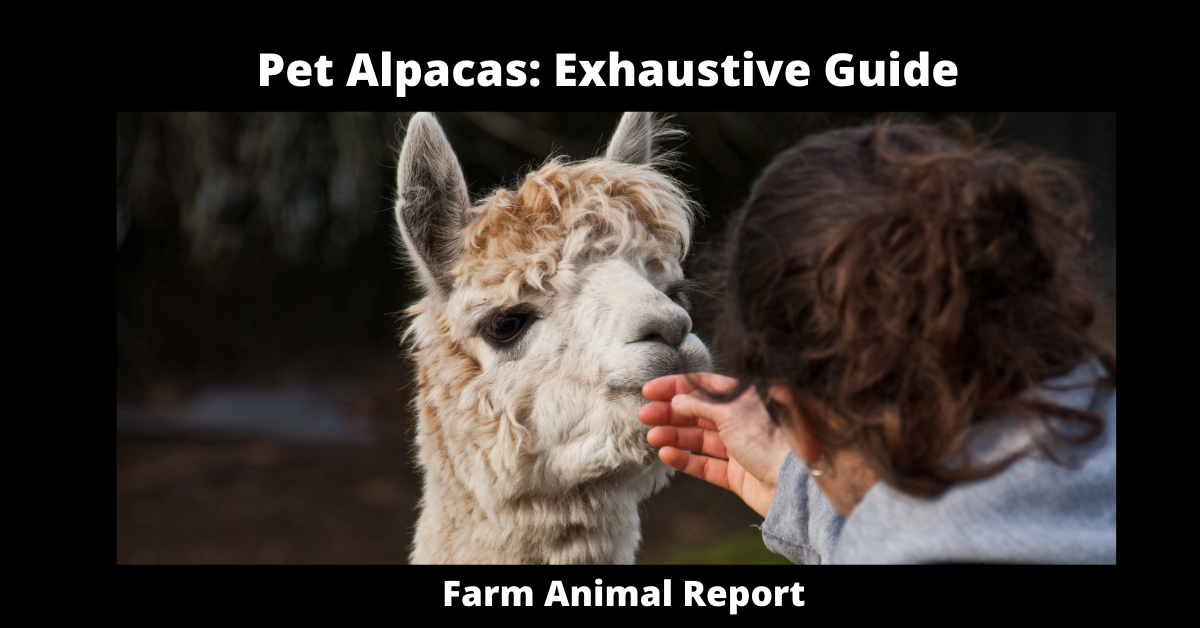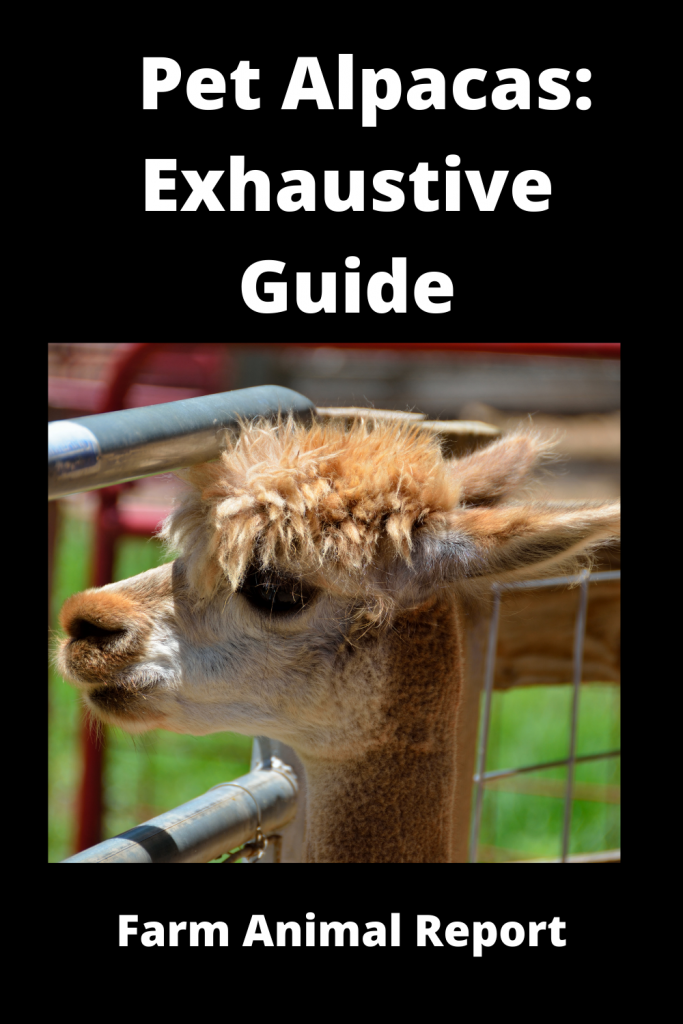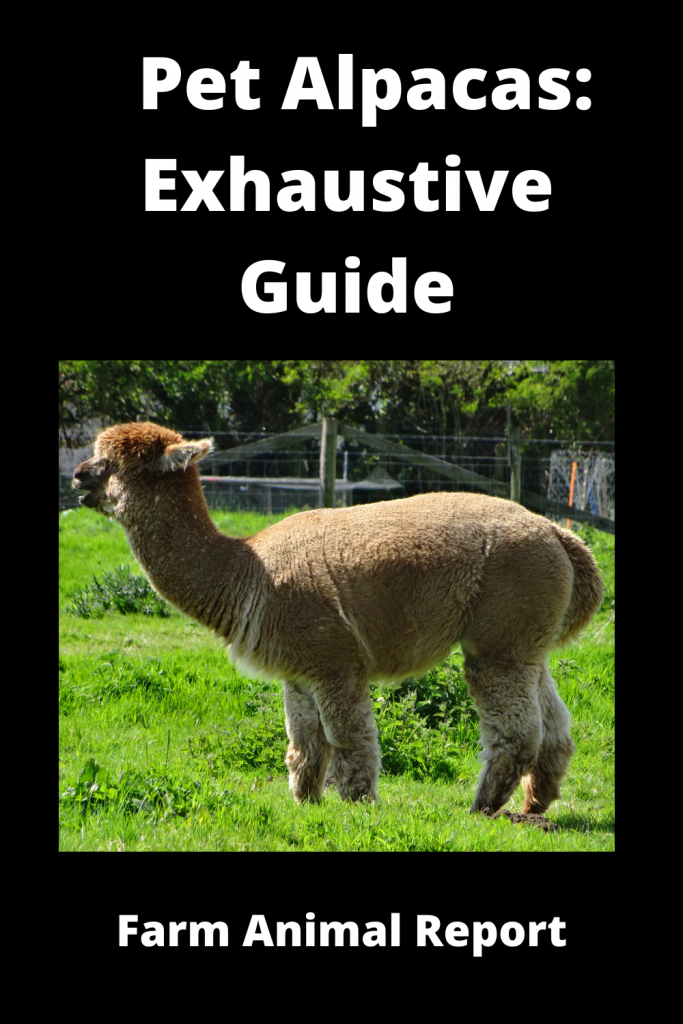As a General rule Alpacas make excellent pets, they are gentle, easy to train, and easy to handle. Additionally, they are incredibly loyal. Even if your primary reason for purchasing an alpaca is its beautiful fleece, alpacas can be used for other purposes. If you’ve ever pet an alpaca, you’re probably aware of how soft their wool is. Not only is their fleece incredibly soft, but it is also rated a 1 for fire resistance by the United States. This means that the fleece fibers are highly resistant to fire.
Pet Alpacas: Complete Guide
Pet Alpacas – They are not related to sheep or any other more common “Old World” domestic animal due to their peculiar, fluffy charm – gangly neck and legs, pointy ears, cleft toes, and super-soft coat. They are related to llamas and are the domesticated form of the wild Vicuna.
Check Out Amazon’s Educational Resources for Raising Alpacas
Alpacas and Vicuas are smaller cousins with more delicate fibers in their coats, whereas llamas and guanacos are larger and have a coarser coat. They are members of the Camelid family, named after camels – another cousin, along with dromedaries.
Although South American camelids lack humps, they share several characteristics with their African and Asian counterparts. This is particularly true when one examines their face. They all have large, mournful eyes framed by long lashes, a long neck, and two-toed feet. The following are four reasons why alpacas make excellent pets: More and more people are embracing alpacas as pets, especially in North America. Yes, Alpacas make excellent pets as long as you take good care of them and are realistic in your expectations.
Alpacas Can Be Dual Purpose
Alpacas make excellent pets; they are gentle, easy to train, and easy to handle. Additionally, they are incredibly loyal. Even if your primary reason for purchasing an alpaca is its beautiful fleece, alpacas can be used for other purposes. If you’ve ever pet an alpaca, you’re probably aware of how soft their wool is. Not only is their fleece incredibly soft, but it is also rated a 1 for fire resistance by the United States. This means that the fleece fibers are highly resistant to fire.
Another advantageous property of alpaca fleece is its waterproof nature. This makes it an excellent substitute for sheep’s wool and cotton. Additionally, alpaca wool is hypoallergenic, which means it will not itch or aggravate your allergies. It can be used to create sweaters and blankets and even sold.
Alpacas Are Extremely Social
When you first acquire an alpaca, it may appear distant or skittish. This is to be expected, given that your new pet is in an unfamiliar environment with unfamiliar faces. Alpacas, on the other hand, have a personality similar to that of cats. Once you’ve earned their trust and demonstrated to them that they have nothing to fear, they’ll allow you to approach them more closely. Once your alpacas become acquainted with you, they will become tame enough to let you pet them, feed them by hand, and even cuddle with them; avoid their heads. Alpacas are highly playful and get along well with children—especially when socialized from an early age. Unlike adults, they are not typically fearful of children, most likely due to their relative size.
18 ways Alpaca Farmers make Money
They are All Unique
While the majority of alpacas are extremely curious and playful, this is not always the case. Alpaca pets are similar to humans in that they each have their distinct personalities. Specific individuals are more outgoing and interested, while others are more observant and reserved. Additionally, they are known for their wide range of colors, which is one of the reasons alpaca fiber is so popular. The wide variety of colors eliminates the need for dyeing during production.
Officially, sixteen distinct shades of alpaca fleece, including white, brown, black, gray, and numerous shades in between. These unique color and personality combinations will keep you spellbound and admiring your alpacas for hours on end.
Alpacas Are Extremely Intelligent
One of the primary reasons alpacas are popular is their ease of training. They are typically receptive to food rewards and can even be taught basic skills such as sitting and using a litter box. Although alpacas are generally social and get along with most other animals, adding one to your property is akin to adding a protector. These incredible creatures are excellent at deterring all types of predators, including coyotes. Alpacas are used in some countries to transport bags and camping equipment, similar to how horses are used.
How much does it Cost for Buying an Alpaca?
Many owners overlook that alpacas require ongoing medication to prevent certain deadly diseases, so the early cost is not the only consideration. Additionally, there is the fencing and shelter to consider, as well as the food. How much do alpacas cost, then?
The Initial Cost of Buying an Alpaca
How much are alpacas? Alpacas that have been bred must remain with their mothers for several months before being sold. Purchasing from a reputable farmer is critical, though this will require you to pay a reasonable price. If you are buying rarer breeds, the cost per head can reach $5000 or more. A typical alpaca can range in price from $500 to $50,000 or even more, depending on demand, breed, and gender (males tend to cost more). The majority of them will cost between $1000 and $5000.
Breeding
If you only own female alpacas, you will require male breeding companions. Some farmers in this business will share their males for breeding purposes, but this can cost between $1000 and $5000.
Fencing and shelter
You want to ensure that you take care of the fencing before purchasing alpacas, as this will keep predators out. This will cost between a few hundred and several thousand dollars, depending on the domain’s size.
Food
This should not be prohibitively expensive, particularly if you purchase hay. They prefer second-generation hay, and because they can be picky, you may need to import it.
Medication
Medication is a frequently overlooked aspect of alpaca ownership, but it is necessary to give them preventative medications to avoid deadly diseases. This will require monthly administration and will cost approximately $200 per alpaca per year.
Other Health Costs and Shearing
You will need to shear your animal at least once a year, as well as clip its nails and examine its teeth regularly. Additionally, this can cost several hundred dollars.
Do Alpacas like to be Petted?
Alpacas generally dislike being petted, though they will tolerate it from specific individuals. An alpaca may even enjoy being petted by a favorite person or family member in some cases. Their prior socialization will determine their response to other people. Always obtain permission from the owner before petting an alpaca.
Do Alpacas and Dogs get Along?
Alpacas and dogs can coexist peacefully if both animals have been trained to behave appropriately around the other species. Dogs must be trained to protect alpacas rather than chase them. Alpacas must be socialized with dogs to avoid attacking or fleeing from their canine companion.
Alpacas are naturally wary of canine family members but get along well with other livestock. They can easily coexist with sheep and llamas in the same pasture. Caution should be exercised when pasturing alpacas alongside horses and cows, as the alpacas may be harmed if kicked. We believe that housing alpacas with goats are not ideal because goats and alpacas share internal/gut parasites. Alpacas can be poisoned by medicated feed typically given to goats.
Can I Raise an Alpaca in my Backyard?
Yeah, you can have an alpaca in your backyard, but make sure you have more than one. This is because alpacas are highly social creatures within their herd.
They are matriarchal, which means that even if a male is present, the female will be the boss. There will always be a leader in a herd of males. It would help if you did not have a single Alpaca because it will become ill and die. If you have two, you will have one who thrives on authority and another who despises being bossed around.
Three Alpacas in your yard will establish a leader, and the other two will recognize their roles. A herd of three or more Alpacas is happier and more settled, so always strive for this. Alpacas spend their time in herds in family units, where sisters, mothers, and babies congregate.
How big of a Yard do you Need for an Alpaca?
An acre of land is needed for every five animals. You can keep ten Alpacas on an acre, but you should supplement their diet with hay at least once or twice daily. This is because one acre of grass is insufficient for them.
In designated pasture areas, alpacas graze on fescue grass and alfalfa. To ensure the animals always eat fresh grass, establish separate pasture areas where the herd can be rotated. Males (7 months and older) and females should be kept in different pastures. Clean the pastures at least twice a week to prevent disease spread. If you have small fenced areas, such as pens for grooming, watering, and hay distribution, ensure they are properly maintained and cleaned daily.
Fencing in Alpacas
Alpacas are not the type to challenge fences because they have padded feet instead of hooves, weigh more than an average adult human, have only teeth on the bottom jaw, and have a reserved personality. Alpacas defend themselves by spitting digestive juices, which, as you can see, is insufficient. As a result, you should construct a sturdy fence around them to protect them from predators.
Dogs may attack them, mountain lions, coyotes, or bears, depending on where you live. Install a chain-link fence or another strong barrier to prevent other animals from escaping. Barbed wire fences should be avoided at all costs due to the risk of fleece damage.
Do I need a Licence to Keep Alpaca?
At the moment, a CPH is not required to keep camelids (alpacas, pet llama, etc.), although some keepers choose to obtain one. If you keep animals on another person’s property, you will still require your CPH.
Can you Keep only One Alpaca?
While owning a single alpaca is possible, it is not a pleasant existence for the animal. Alpacas, like other domestic livestock, are herd animals and are naturally gregarious. They gain security and contentment from the company of at least one other alpaca. It is recommended that a least two or three alpacas be kept.
How much does a Mini Alpaca Cost?
Alpacas suitable for pet ownership can be purchased for as little as $250 or as much as $1,500, with an average cost of around $500 – $1,000. When purchasing pet alpacas, it is critical to consider the alpaca’s appearance, friendliness, breeder quality, and overall farm animals’ health. Not all alpaca farms, breeders, or farm animals are equal in terms of “pet quality,” so shop around and visit a few animal farms.
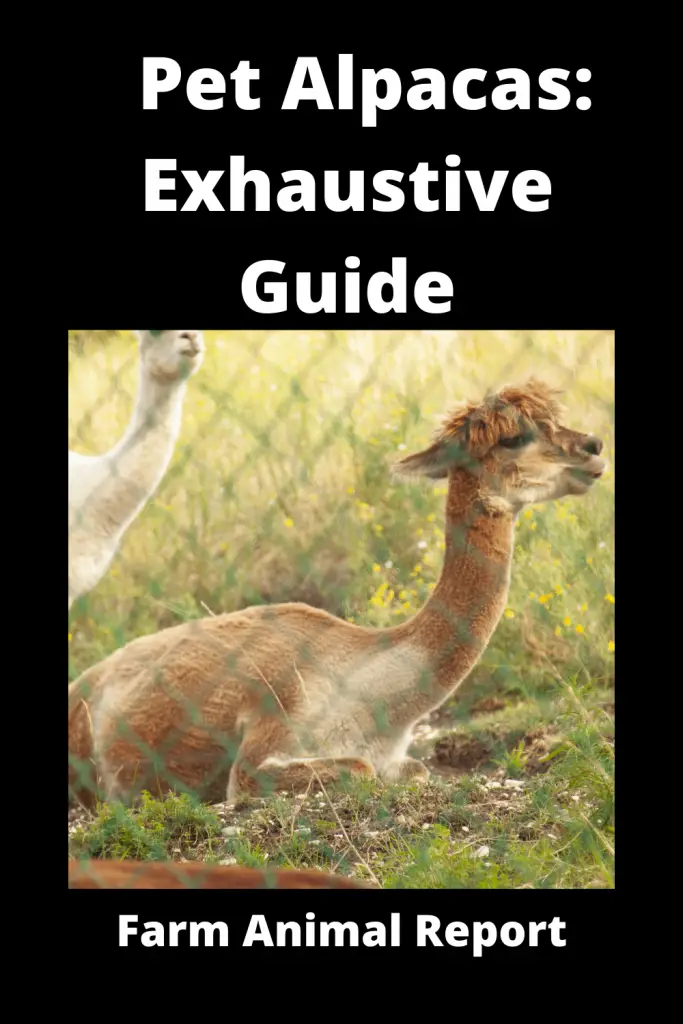
Are Alpacas Good Pets?
Most alpacas make excellent pets if they are properly cared for and their owners have realistic expectations. As is the case with all livestock, the more handling they receive as juveniles, the quieter they become as adults. Some alpacas will eat out of your hand given enough time, and provide education to follow a halter is a simple process. Alpacas dislike being held in general and are especially sensitive to touch them on the head. Alpaca are curious and intelligent, and if you allow them to approach you rather than charging at them and expecting an affectionate response, the interactions can be gratifying.
Are there Miniature Llamas?
To qualify as miniature, a llama’s front withers (or shoulder height) must be no more than 38 inches at the age of three. Thus, it is approximately three-quarters the size of a standard pet llama but slightly larger than an average alpaca.
How Friendly are Alpacas?
Alpacas are lovable, intelligent, and gentle creatures with endearing faces and inquisitive personalities. They make lovely pets and are helpful for a variety of tasks. Alpacas are naturally curious, docile, and friendly creatures who, when handled properly, can be quite affectionate. They make lovely horses, sheep, goats, and even chickens companions! Alpacas thrive in small paddocks – up to an acre can accommodate 4-6 “furry lawnmowers.” They remain in their fields for the entire year and do not require confinement; however, they should have access to shelter. Due to their South American origins, they are hardy animals accustomed to extremes, and they may forego shelter even during our most bitter winters.
Pros and Cons of Keeping and Alpaca as a Pet
Pros
On the other hand, they consume little food and are thus relatively inexpensive to keep. They cost about as much to feed as a large dog. Due to the absence of upper teeth, they are highly cautious grazers and generally do not damage the grass. They require less land per animal than many other large animals do. They are usually very healthy and breed and give birth very easily, rarely requiring intervention. Alpaca fiber products continue to be in high demand. Additionally, there are numerous tax benefits associated with alpaca ownership.
Cons
Alpacas are expensive to purchase and require predator protection. They need protection from the extremes of cold and heat. They should be sheared once a year by a skilled shearer. If you lose an animal for whatever reason, a significant sum of money is wasted.
Do You Want Alpaca as a Pet? Why?
Numerous aspiring alpaca pet owners desire this animal due to its fluffy and adorable appearance and gentle demeanor. However, there are some pretty cool advantages to owning an alpaca.
- The primary benefit of alpacas is their fur, which can be used as fleece to knit clothing and other apparel items. Some alpaca owners prefer to profit from the fleece, while others use it to make clothing such as socks, hats, and shirts. Alpacas should be sheared at least once a year to ensure that you have a decent amount of fur to sell or keep for yourself.
- Their fiber is significantly stronger, warmer, and more resistant than most other types of wool. It is hypoallergenic and odor resistant.
- They’re a pleasure to own because they’re pleasurable and low maintenance. Additionally, they will get along well with any other animals you may own (unless those animals are aggressive).
- Alpacas require little daily care. They need only a sufficient supply of food (hay or grass), water, and adequate space.
- They are also much cleaner than most other herd animals, as they will use a single communal area to poop and pee, making cleanup much easier.
- Another advantage is that alpacas are tough animals that can survive in both cold and hot climates. However, shear them before the weather becomes too hot.
- They are excellent breeders, as a female can produce one cria (alpaca baby) per year.
While there are numerous advantages to owning pet alpacas, there are also some critical factors to consider.
What Do Alpacas Eat and Drink?
Alpacas are not fussy eaters. They enjoy grass and hay – hay is likely to be their primary source of food. Alpacas prefer second-generation hay because they prefer slightly seasoned grass. This means you may need to import it, though you should not have difficulty locating it among some farmers.
They may be selective about their hay, but once you’ve identified the food they prefer, you can put it out and let them feed themselves. They’re incredibly low-maintenance in terms of diet.
Additionally, some alpaca owners purchase or make food pellets from vegetable sources such as grass and other components. These are slightly more expensive, but they are also more nutritious. Grass and hay, on the other hand, will work the best.
Alpacas require a constant supply of water. If you own three alpacas, the best solution is to keep a bucket of water in the shelter. However, if you own multiple alpacas, you’ll need a water tank or a more extensive water tub –make sure the water is clean and free of bacteria.
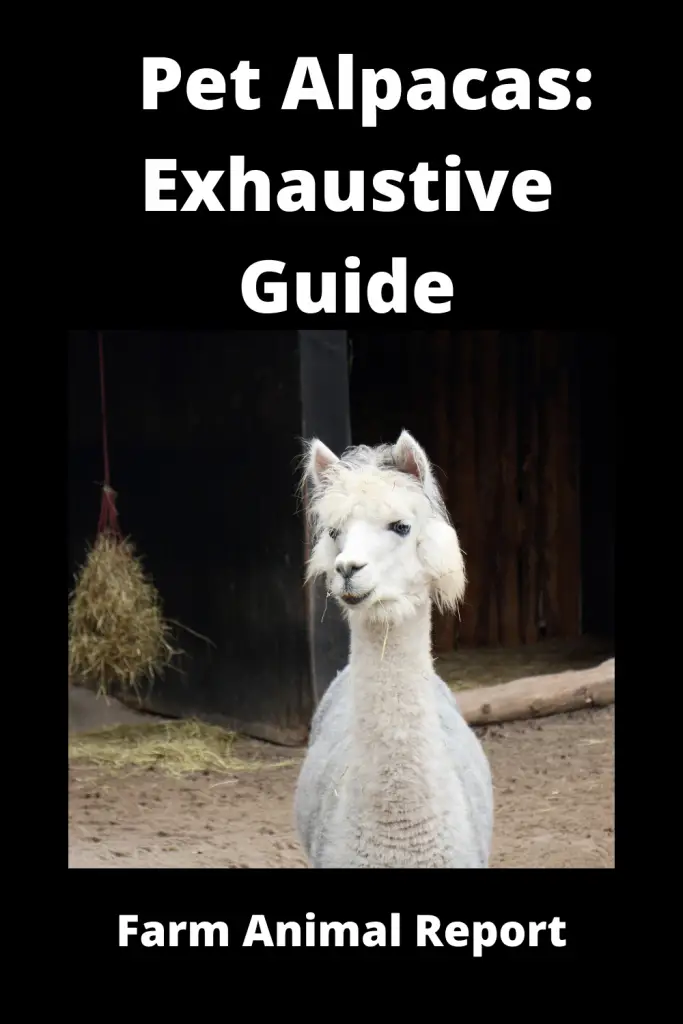
Alpaca Health: What to Look Out For?
Alpaca health is one area that may be a little more challenging for beginners. You must ensure that it is constantly vetted by a veterinarian (1-2 times per year). You’ll need to locate a veterinarian who is experienced with alpacas and similar animals. The veterinarian will make health recommendations on how to care for the alpaca in the future.
Additionally, the veterinarian will prescribe some preventative medications and vaccinations for alpacas that must be administered monthly. These diseases may have been introduced by other animals in your backyard and can easily be transmitted to the alpaca, where they can be fatal. All alpacas must be vaccinated monthly to avoid contracting these diseases.
Alpacas, in general, are quite susceptible to a variety of diseases, which is why they require constant care and veterinarian examinations. Additionally, you’ll want to clean and inspect the alpaca’s teeth frequently – typically, the vet will do this for you, but you can do it on your own occasionally to ensure there are no defects – which can quickly occur.
Learn More – 18 Ways that Alpaca Farmers Make Money
Final Thoughts
If you have a considerable amount of land and are looking for some unusual pets to add to your family, alpacas make excellent protectors and companions. They are also brilliant. These herd animals live near one another. Additionally, they produce a soft fleece that can be shorn and sold. Families with children also need not be concerned; unlike some animals, alpacas are typically very friendly.


